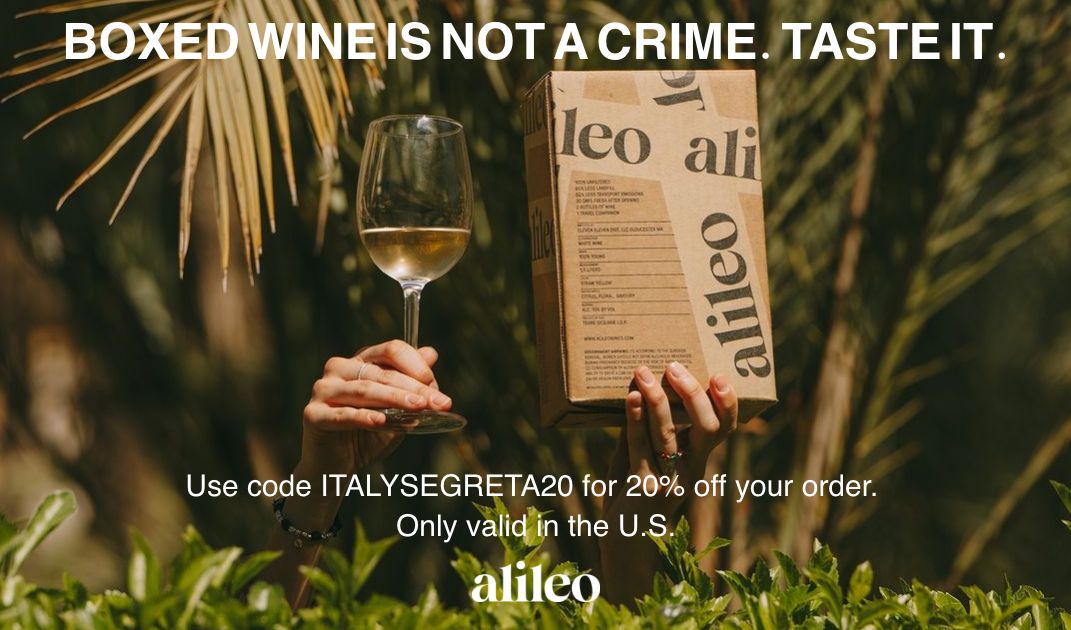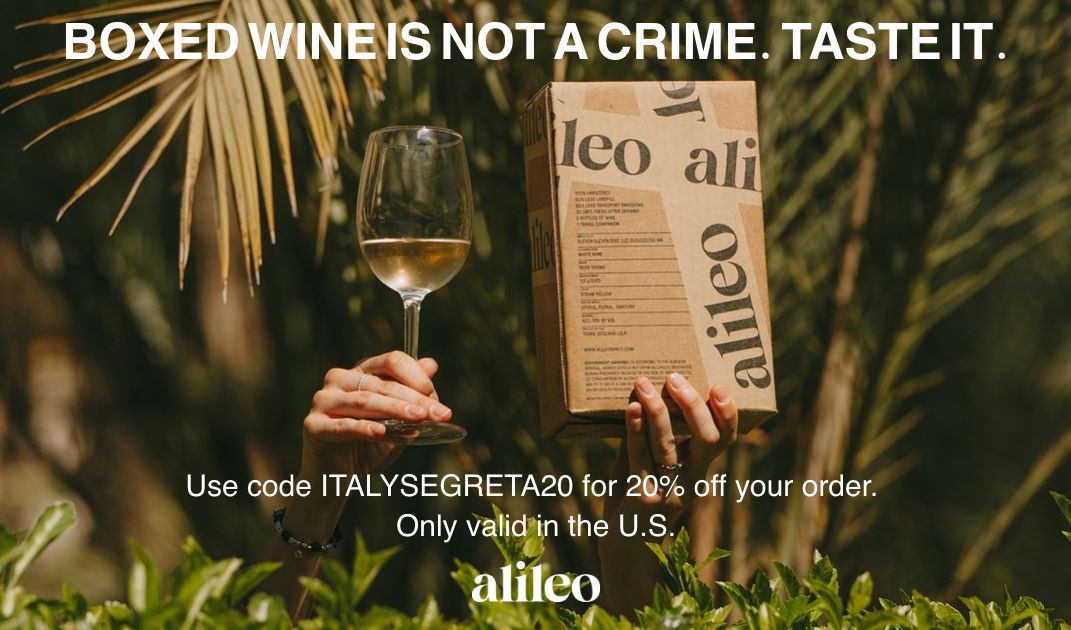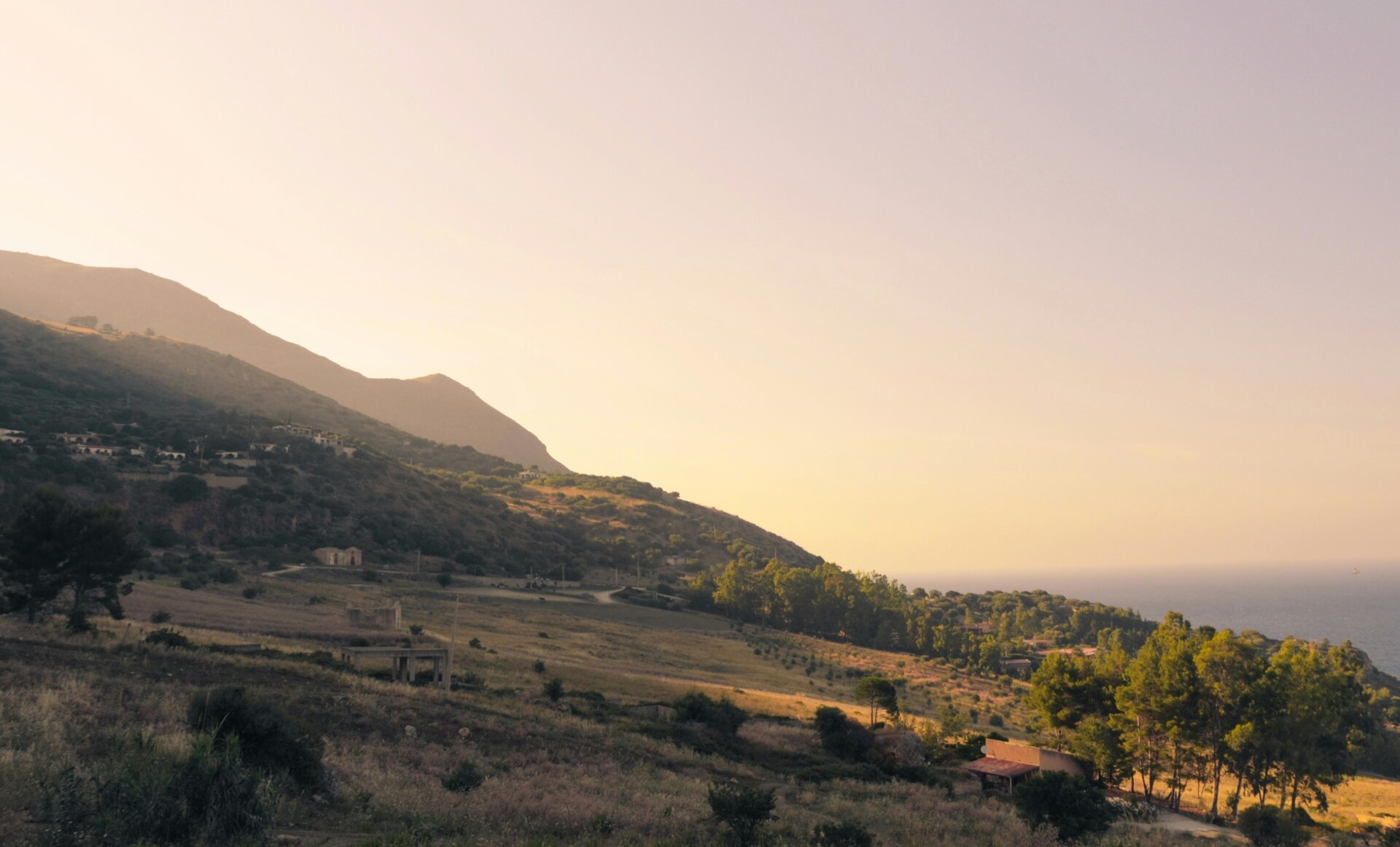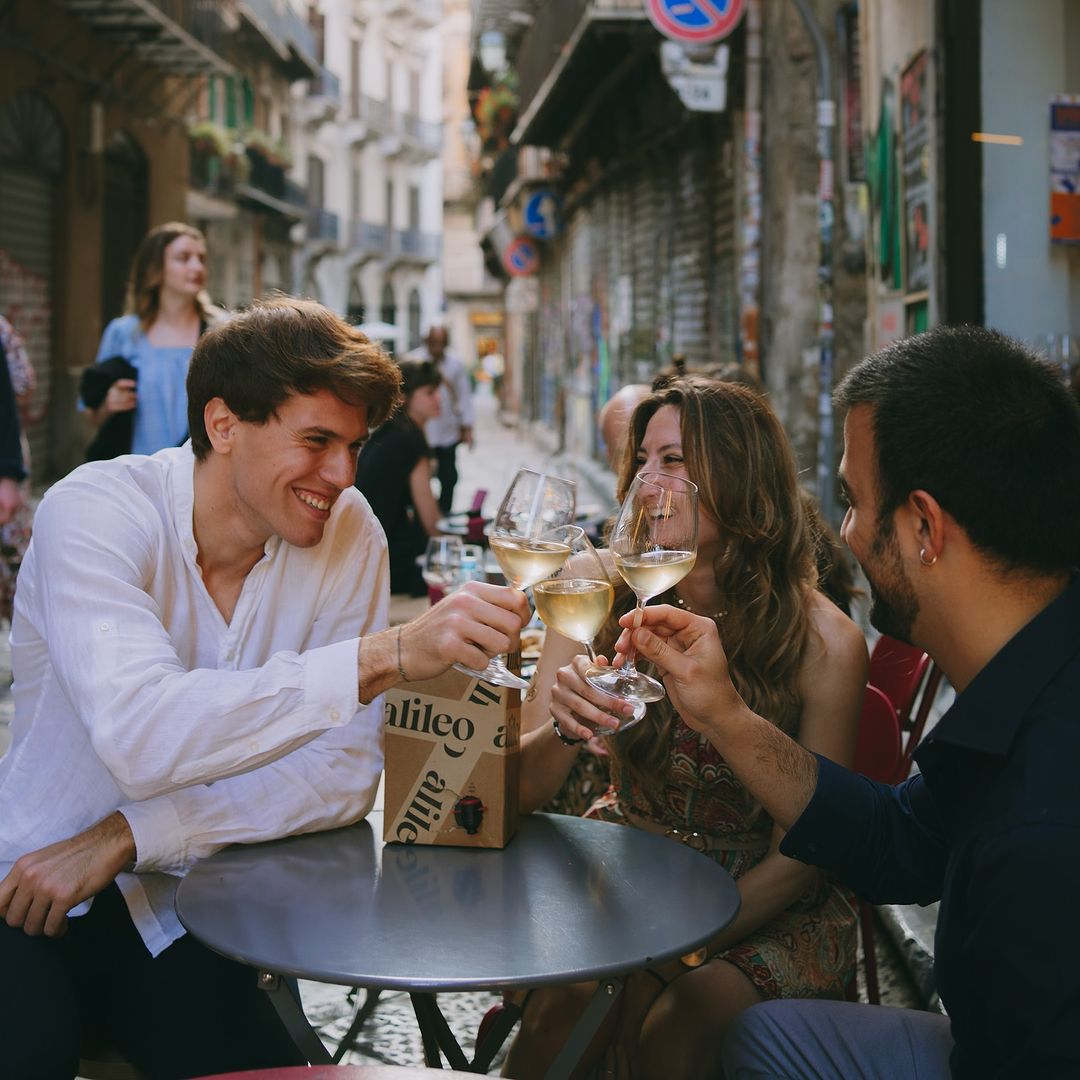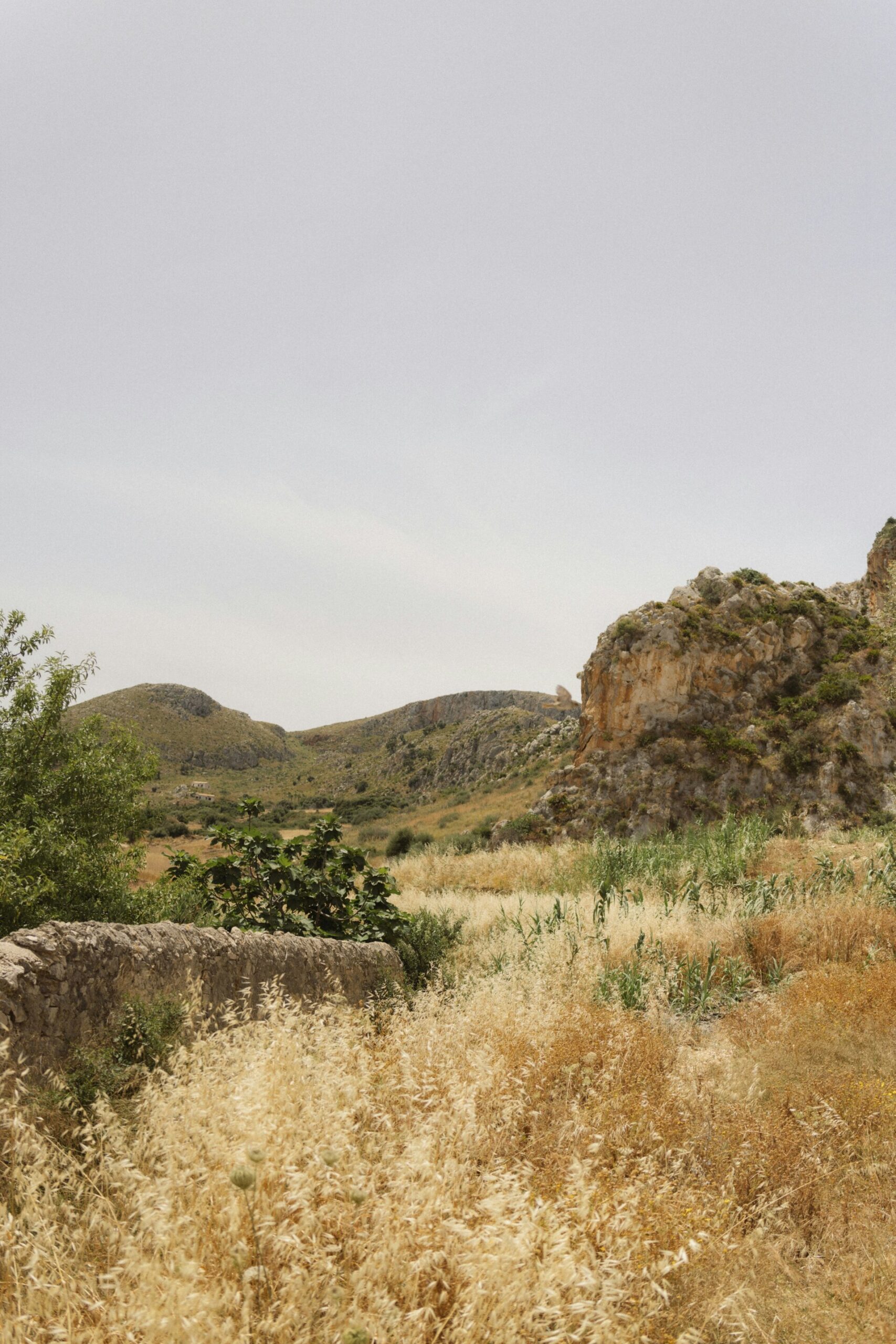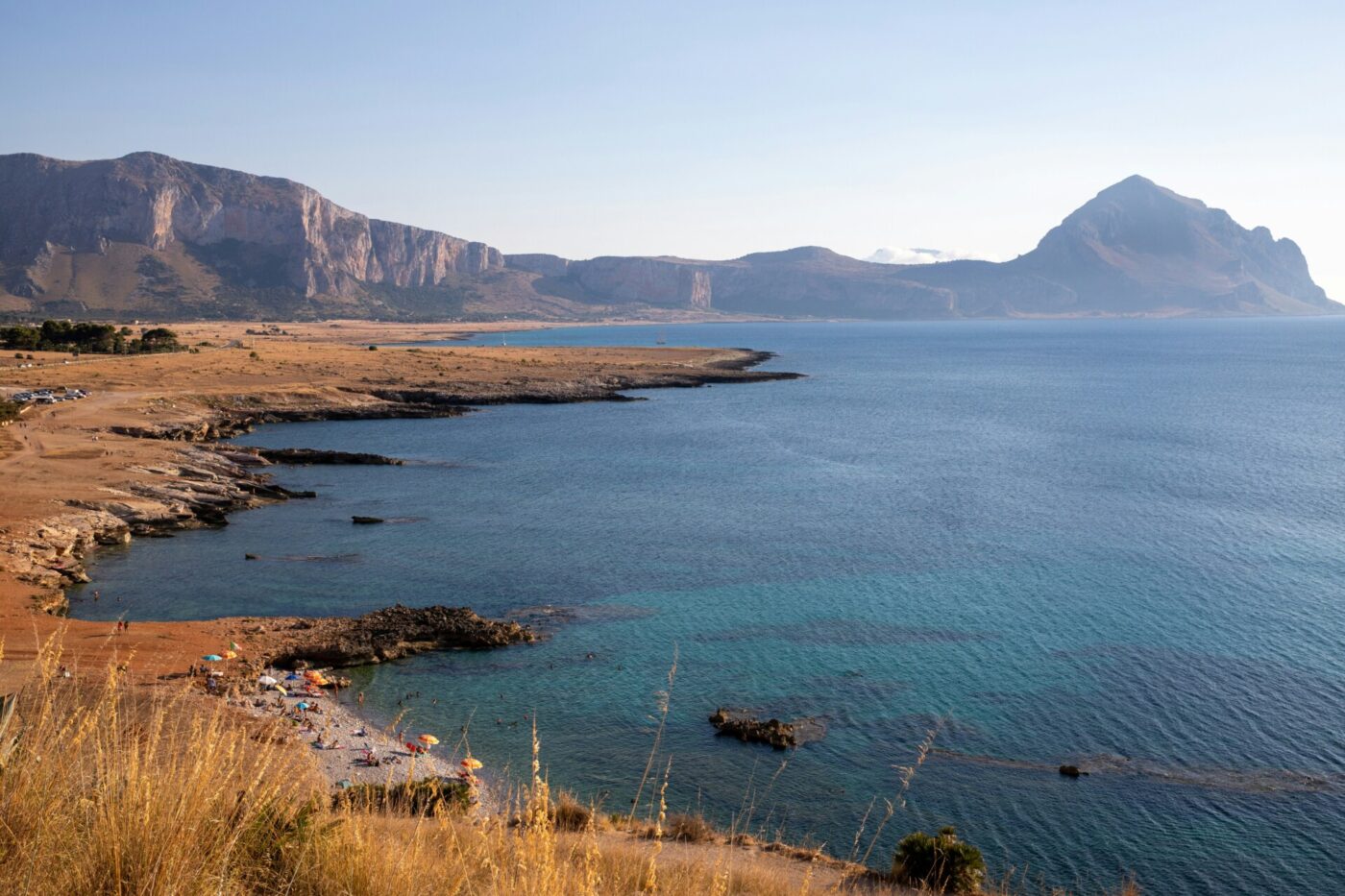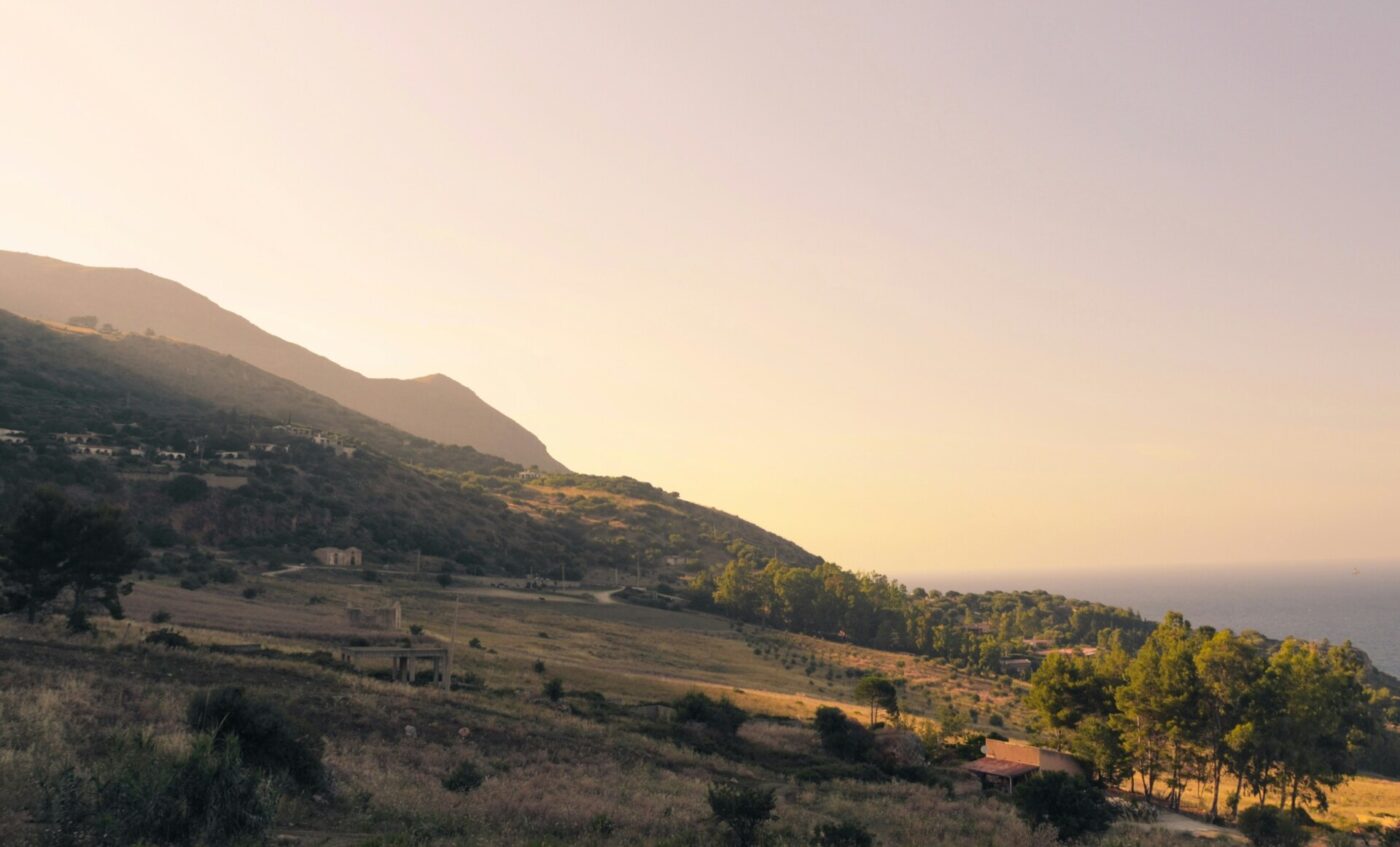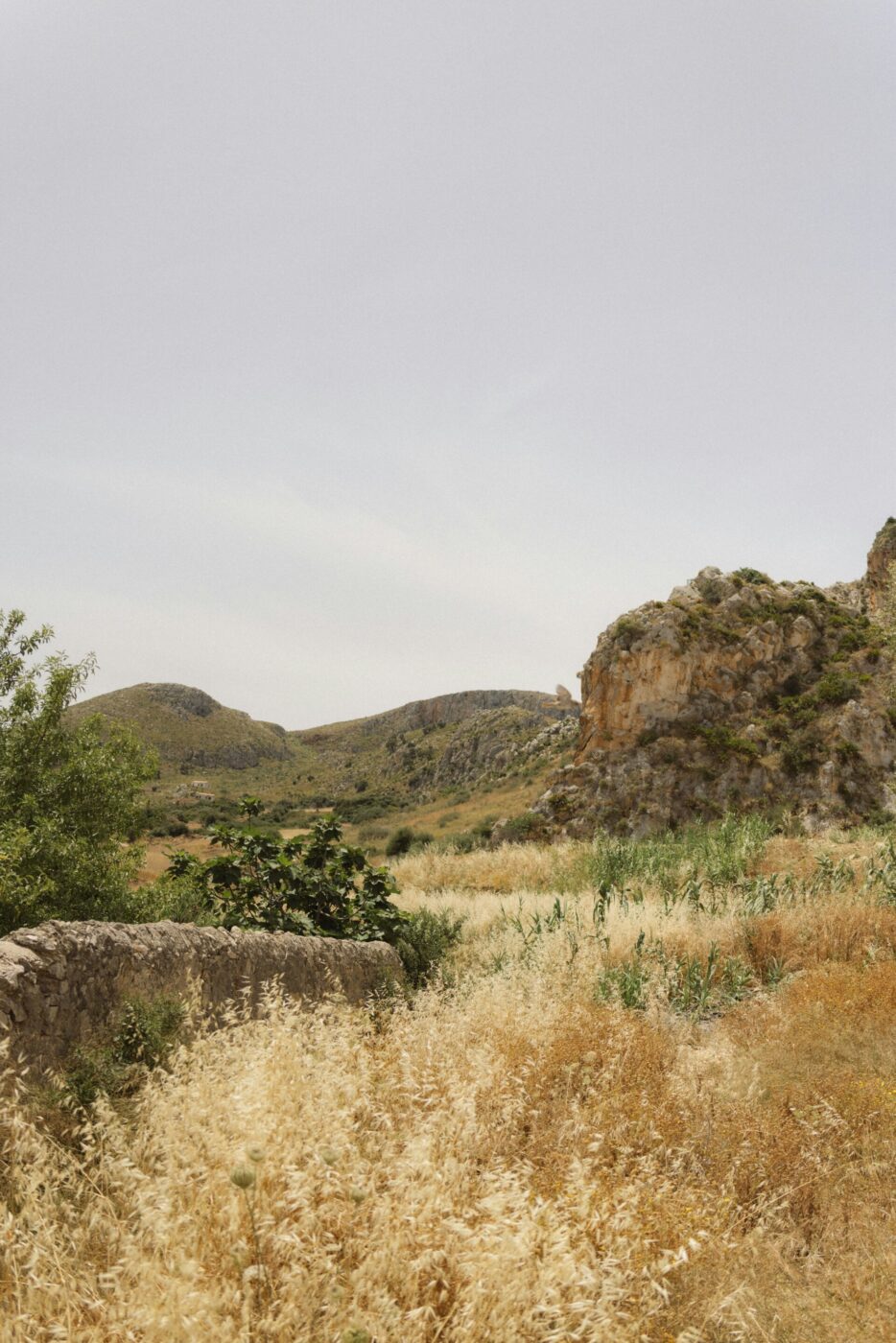A free “BOXED WINE IS NOT A CRIME” bumper sticker comes with every purchase from Alileo. The natural wine company, founded by husband and wife duo Alexandra Drane and Antonio Bertone in 2021, packages its fermented juice, yes, in the much misunderstood bag in box format–“the most controversial packaging ever,” Antonio tells us with a laugh–in this case, not an indicator of low quality, but one that allows the quality of the wine to shine.
With four varieties on offer–syrah, zibbibo macerato (“an iconic sicilian grape”), rosato bronzato, and young grillo–Alileo grows their grapes on what Antonio calls the “wild west coast of Sicily.” It’s the type of product that really profits from the best of both worlds: Italian grapes and winemaking techniques in cahoots with American technological advancements in packaging; rather than having your opened bottle of natural wine tip over the funky edge after a few days, a box of Alileo stays fresh for over 45 days. But, to the founders, it’s really about making Italian wine culture more accessible to an international audience, skirting the prohibitive price point that often comes with importation.
“We want to bring a younger audience into the world of wine. Because wine marketing, and just the general wine industry, is stuck in some weird 1986, Robert Parker bullshit,” says Antonio, who was born to a Molisano father and a Sicilian mother and grew up between Italy’s largest island and Massachusetts. We sat down with the entrepreneur, who loves “to go against the grain,” to discuss Sicily, his Sicilian-American identity, and the challenges that come with running a business between Italy and the US.
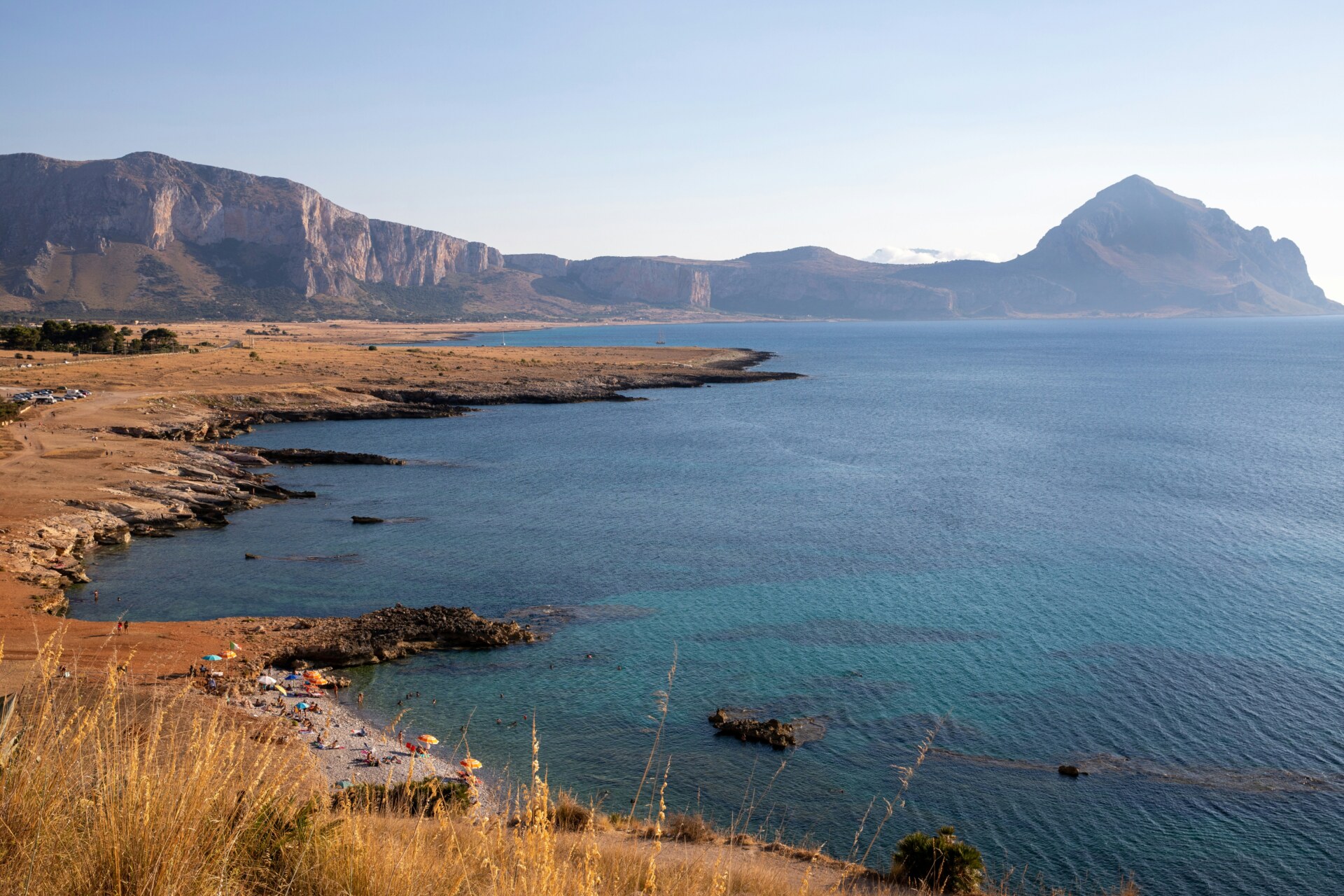
Province of Trapani
IS: Tell us more about where you grew up in Sicily!
AB: I grew up on the west coast, in the province of Trapani, in a town that’s now world-famous called Partanna. Because a guy in Partanna convinced Howard Schultz [the former CEO of Starbucks] that we pour olive oil in our coffee. And that’s how we
start our day. That’s bullshit. So I just imagine that was a very creative conversation and it led to this “oleado” movement. It’s great, though, because it shined a spotlight on an incredible village and an amazing product; the Nocellara del Belice, in my opinion, is the standard for olive oil.
IS: Why do you call it the “wild west coast”?
AB: The western side is very rustic, right? The eastern side actually functions: it has tourism, infrastructure, hotels, in large quantities. Our side was always a little bit backwards, a little slower. A little raw. And in my opinion, more realistic of what Sicily really represents. It’s magical because of its lack of wanting to assimilate to the global norms.
IS: So why did you choose to invest in the area with your business?
AB: I come from a consumer products background; I was very fortunate to have a great career in global companies like Puma and Whoop. But obviously my home, or where my heart has always been, is Sicily. There’s always been my family there. During COVID, my mom was ill with cancer, and we spent a lot of nights locked in our kitchen, cooking and singing Italian folk songs from the ‘60s and ‘70s. We found that Spotify had an incredible library of old-fashioned songs that my mom would relate to. My wife and I used to spin a yarn with my mom about how we’re going to do something to keep that bridge from the US to Sicily alive, even after she passes.
My mom never spoke English. Since she came in the ‘70s, she just refused. She was a Siciliana tosta. She never felt the need to speak English, she never cared to, and she never became a citizen. When Trump became president, that was a shit show, because my 80-year-old mother was obviously here to steal jobs. So my mom would live six months out of the year in Sicily and six months here in the States. We would go back and forth all the time to hang out, spend time with family. So we said, “Listen, we’re gonna create something that builds that bridge forever. So you don’t have to stress that Sicily dies off when you pass.”
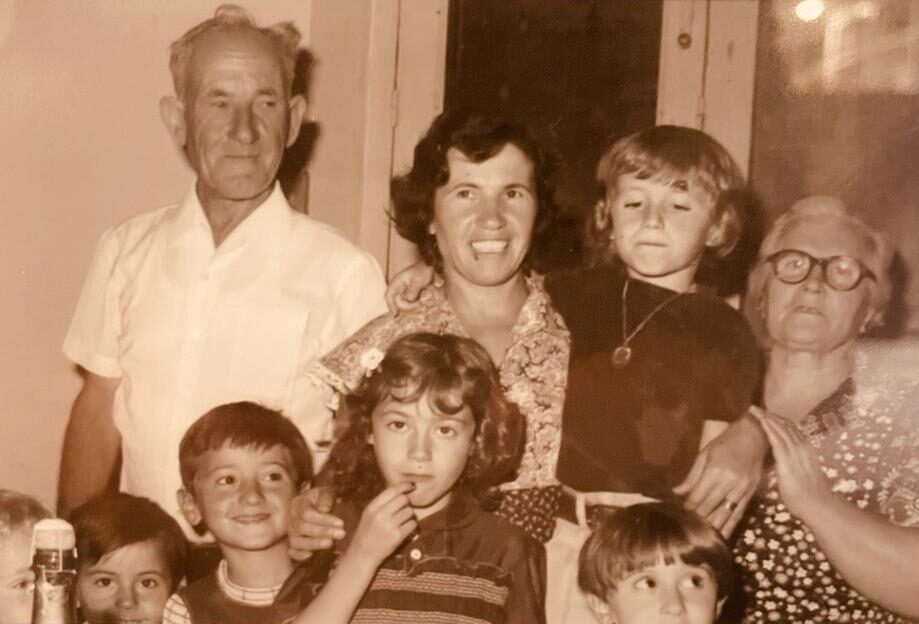
IS: How did you land on a wine brand?
AB: My cousin Rosario has been a winemaker since his teens. At some point, my wife and I were like, “Let’s just start a wine brand.” We’d always joked about it. Obviously, Rosario was going to make them on our side of the island and we were going to promote the wild west coast of Sicily. We were sitting around the kitchen during COVID, brainstorming, and came up with the name Alileo because it’s all of our names scrambled together, between my niece Alessia, my wife Alexandra, our daughter Lily, our son Leo, and me, Antonio.
IS: And why the boxed wine format?
AB: My wife’s a serial entrepreneur, so we always try to figure out, What’s the USP of this product? How are we going to stand out? How do you get younger people to feel like wine is more approachable? Sustainability was important to us, because we talk about the environment and its impacts all the time. Design is important to us. We like
the natural wine movement purely from a kind of a “less bad” standpoint. So we decided on low-intervention, natural wines. And we decided to put it in the most controversial packaging ever, which is the bag in box. But, as a packaging, it’s the most superior from a functional standpoint if you’re not looking to age wines. We’re making a consumer product: we want people to enjoy the wines, we want the wines to have no junk in them, and we want them to last for a long time, especially when you’re just a casual sipper. The fact that the wines can stay fresh for over 45 days once you open the box is pretty magical.
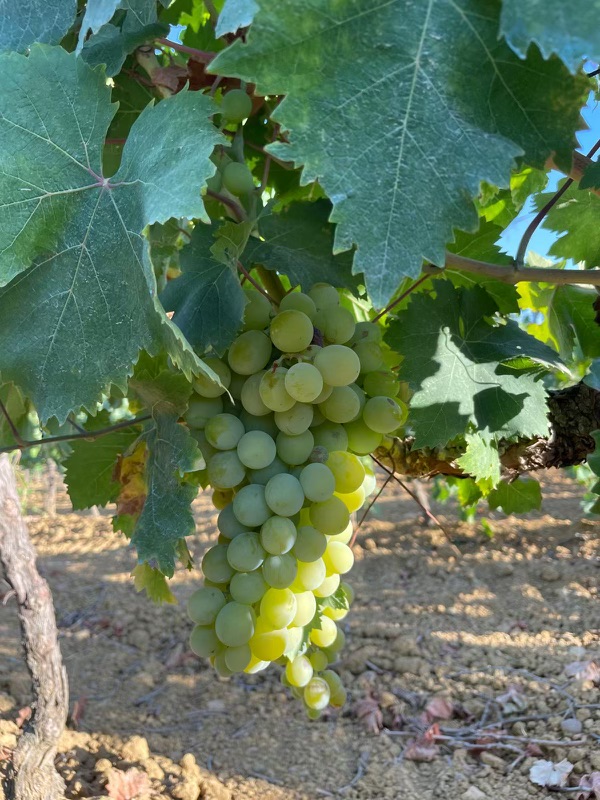
Alileo's Sicilian vineyards
IS: What was it like trying to break into such an established industry in Italy?
AB: It’s difficult to start in the world of wine from scratch. A lot of these [wineries] start from a historical, family-run place or an industrial place. Trying to be a startup in this world, you need a lot of things to go your way. So we had a lot to learn, and we’re still learning. Decanter World Wine Awards is a big global wine award, and in 2023, they opened the category for the first time ever to alternative packaged wines. We were one of two companies to win a silver medal, with our Syrah. In the end, it starts with the product; the wine needs to be good. And that’s where my cousin is such a talent. A lot of this is to bring that culture of American opportunity to Sicily.
IS: Not many people are bridging the entrepreneurial gap between Italy and the US. Where are the challenges in this?
AB: We need to learn more about Italian red tape, because the system is designed to kind of take advantage of you, of the government–everybody’s looking to make a little extra money, because it’s not black and white. It’s murky, and I often ask myself, Is it murky by design? I mean there are taxes that make no sense when you have a volume that’s so small. While in the US, it’s fairly cut and dry. You’re importing liquid. It’s under a certain alcohol quantity. This is your tax rate. If you are this small, you actually get a break on your taxes. How can you compete against the larger market forces otherwise? In Italy, even just paying my cousin as a consultant requires financial gymnastics. Italy can’t get out of its own way.
IS: Identity is a big theme of our ABROAD issue–how do you bridge the Italy-America gap from a personal point of view?
AB: I would come to America and have to defend Italy to Americans. And then I would go to Italy and have to defend Americans to Italians. I was always stuck with one foot in each. It’s hard to truly feel like you belong to one or the other. I used to live in Germany years ago, and I had a friend from South Africa; his kids were born in Germany. We had this existential debate, “Where do you belong?” And he said, “All right, Italy and the US are playing in the World Cup: who are you rooting for?” I responded Italy. He said, “You’re f****** Italian. That’s it, get over it. Stop making it more complicated than that.” I was like, “Wait a minute, I’m having this existential identity crisis and it just comes down to soccer?” His kids rooted for Germany, and he rooted for South Africa.
IS: Have you felt that Italy has not allowed for the nuances in your identity?
AB: When I was a kid, I primarily spoke dialect–just like every kid in Sicily. And you were terrified to slip into dialect when you spoke to anybody north of Rome. When I was 16 and went to mainland Italy for the first time, I was scared to speak. My proper Italian was not at the level that my Sicilian was. As you know, dialects are village bound. You were terrified to be outed as a southerner. That was brutal. Nobody should be marginalized for where they come from. What I love right now–and I don’t know if this is as alive in the streets–but if you cruise social media or any kind of media in Italy, there are personalities that only speak in their dialect or comedians that only tell jokes in their dialect. And it’s widely enjoyed. This is a huge barrier buster for me.
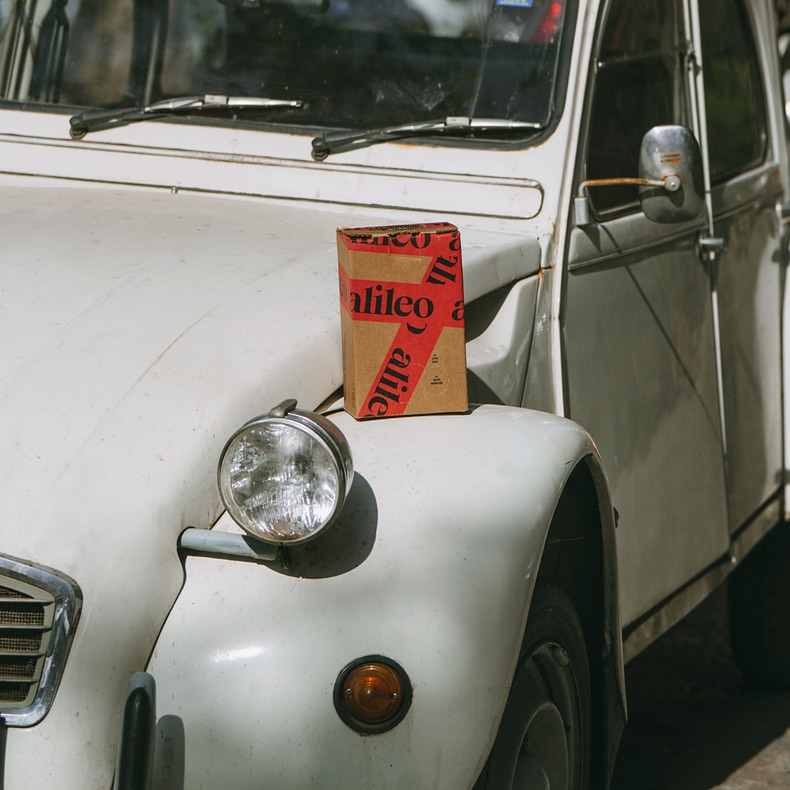
IS: Have you ever connected with your Molisano side?
AB: There was a huge migration movement starting in the early 1900s, and my great-grandfather was one of the first to leave his region to come to Franklin, Massachusetts (of all places!), because it was the start of a pretty major railhead for building the Boston to Maine rail line. He worked very hard for many years, made a great amount of money–great in relative terms–and went back to his hometown of Sant’Angelo in Grotte. Then in the 1950s, when the US actually had an immigration policy, offering able-bodied laborers a path to citizenship if they came and worked, my grandfather, who was in his 50s at this time, moved with my 16-year-old dad, who did not want to move to America. My dad was happy being a contadino; he had his lambs and his horses. But they leave their beautiful little farmhouse and move in above a garage of a distant cousin’s hair salon. My dad quickly started in a donut shop, working as a baker at five in the morning and then as a stonemason in the afternoon, until he got his job on the rail line. It took them five years to get everybody [in the family] reunited. Basically the whole village of Sant’Angelo in Grotte and the town surrounding immigrated to this one town in Massachusetts. Everybody still has the same last name.
My dad never wanted to take me to Molise, but a couple years ago, my wife was like, “You do have to go visit your dad’s part, you know?” We as a family went, and it was beautiful, magical. One guy walked up to me out of the blue, calling me Salvatore. I responded that Salvatore is my cousin, and he goes, “Oh, you’re Vito’s kid.” It was crazy. Back then, we had family there; now, the houses are shuttered. Young people have moved away. It’s the typical story of provincial Italy.
IS: Have you seen the same on the “wild west coast” of Sicily?
AB: When I was a kid, it was packed. Now it’s empty. This is the downside of globalization, right? Everybody’s working for a bigger, broader economy rather than supporting the local economy. And the town used to be 25,000 strong. I think we’re barely at 13,000 now. In the summer, in two weeks of August, you see a little life as everybody comes back home. I go to the same bar every day, Caffe’ Bacile Di Bacile Salvatore; Salvatore’s bar has been our bar forever. We can talk for 40 minutes before a second soul comes in. Before you’d have to be fighting to get a coffee.
IS: The region is clearly worth a visit! Anywhere that’s a can’t miss?
I think everybody’s sick of me, always recommending Italy Segreta, because I’m also sick of people saying, “We’re going to Sicily next week or next month, where should we go?” So now I have your article “Sicily: Go Here, Not There” saved in my notes. And I just send that to people: “Just read this. I’m not gonna be able to do better.”
Though you also shouldn’t miss Boulangerie Fiorellino, the best bakery in Partanna!
